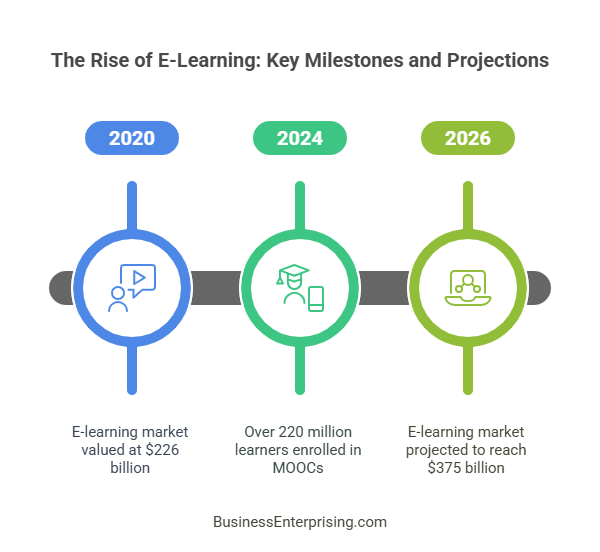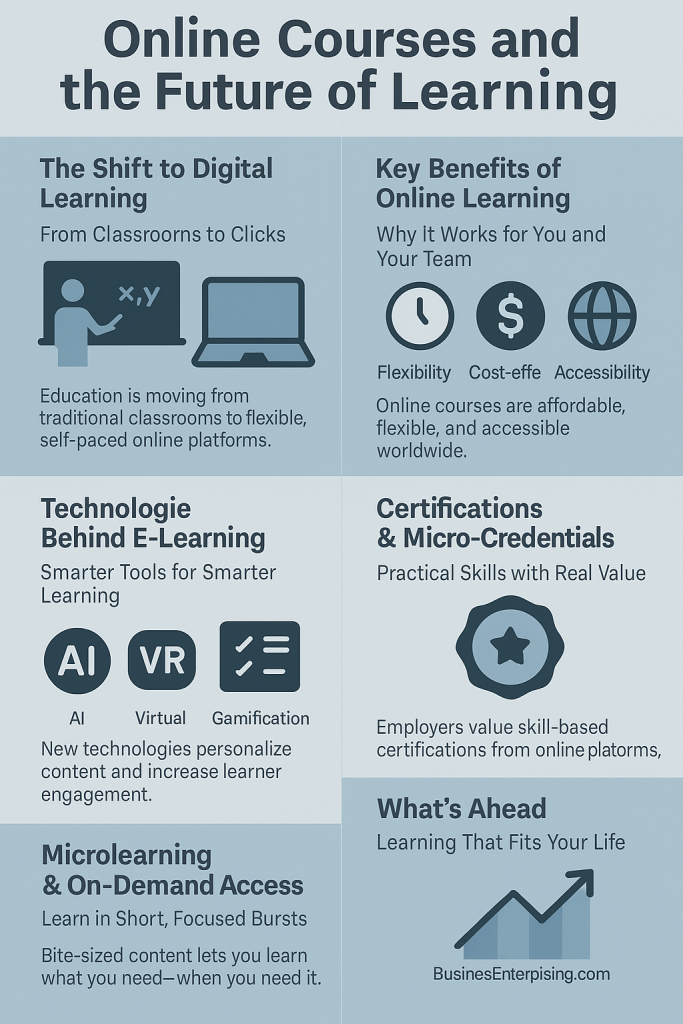 Learning has changed more in the last ten years than it did in the previous fifty. Online courses and the future of learning are now closely connected. You no longer need a classroom or a fixed schedule to grow your skills. Instead, you can learn from home, on your own time, and at your own pace.
Learning has changed more in the last ten years than it did in the previous fifty. Online courses and the future of learning are now closely connected. You no longer need a classroom or a fixed schedule to grow your skills. Instead, you can learn from home, on your own time, and at your own pace.
Additionally, online education works for nearly every subject or industry. From business and tech to health and design, the options are growing every day. Because courses are often shorter and more focused, you can get results faster. That saves you time and keeps you moving forward.
Many people now use online learning to stay current in fast-moving fields. Others turn to it for a career change or to boost their resume. Therefore, learning has become more practical and more personal than it used to be. You can choose what to study based on your goals—not someone else’s schedule.
Businesses also benefit from this shift. They use online training to teach teams, save money, and improve performance. Because digital tools make scaling easier, companies can train people faster and more consistently.
If you’re thinking about learning something new, now is a good time. Online education is no longer just a backup option. It’s a flexible, proven way to build knowledge and stay competitive. As technology continues to shape the way we learn, you’ll have more tools and choices than ever before.
The Evolution of Education: From Traditional to Digital
Education has changed in big ways over the past two decades. Once, the classroom was the only place where learning happened. Now, you can access knowledge from anywhere with a Wi-Fi connection. That shift is not only about convenience. It’s also about how people work, live, and learn.
As online tools became more common, schools and businesses started to change how they teach. Traditional methods didn’t always keep up with the pace of modern life. Meanwhile, online platforms offered flexible, fast, and often more affordable options. You no longer have to wait for the next semester or commit to a rigid schedule.
Because of this shift, digital learning is now a practical choice for more people. Whether you want to grow your skills or change careers, you can start right away. Online courses and the future of learning are now closely tied together. They make it possible to learn on your own terms and focus on what matters most to you.
Additionally, digital courses can be updated quickly to reflect new trends or skills. That’s something traditional textbooks can’t do. You get current knowledge without waiting for the next edition. Plus, many platforms now use video, quizzes, and interactive tools to help you stay engaged.
As more people rely on online learning, education models are adjusting to meet those expectations. You might already be part of that change. If so, you’re learning in a way that fits better into your daily life. It’s clear that the shift from classroom to online isn’t a trend—it’s the new standard.
Benefits of Online Learning for Professionals and Businesses
Online learning offers clear advantages for professionals and businesses. It allows you to learn new skills without putting your career on hold. Because most courses are self-paced, you can fit training around your schedule without sacrificing work responsibilities.
Additionally, online training is often more affordable than in-person classes. You avoid costs tied to travel, printed materials, and venue rentals. That matters if your company needs to train many employees at once. For small teams, it means you can access high-quality instruction without stretching your budget.
Many businesses now choose online learning to support staff development. They can scale training quickly across departments or offices in different locations. As a result, your company stays competitive while reducing the time and cost of traditional programs.
Therefore, global access becomes a major advantage. You or your team can tap into experts and courses from anywhere. That kind of access expands learning opportunities beyond local schools or institutions. It also helps you stay up to date with fast-changing industry trends.
Because online learning is flexible and efficient, it meets the needs of modern workplaces. You don’t have to wait for a quarterly seminar or annual workshop. Instead, you can learn exactly when and what you need. This makes online courses and the future of learning an important topic for both professionals and business leaders.
Most importantly, this shift supports continuous improvement. You can upskill without leaving your desk. That kind of learning environment gives your team the tools to grow without slowing down operations.
Emerging Technologies Powering E-Learning
Technology now plays a major role in how you learn online. New tools are making e-learning more personal and more effective. These changes help you stay engaged and absorb information at your own pace.
Artificial intelligence leads this shift by adjusting course material to fit your progress. If you struggle with a topic, the system offers more support. If you move fast, it removes extra steps. Therefore, you waste less time and get a more tailored experience.
Additionally, virtual reality brings learning to life. Instead of reading about a subject, you interact with it. For example, medical training or technical skills now include simulations. This makes complex ideas easier to understand and apply in real situations.
Gamification also keeps you focused. You complete tasks, earn rewards, and see your progress. This structure works well if you prefer learning in short bursts. It also helps build motivation by making lessons feel more like a challenge than a chore.
Adaptive learning systems go one step further. These platforms analyze your choices and recommend what to learn next. As a result, you avoid repeating things you already know. That saves you time and keeps your focus sharp.
Because of these advances, online courses and the future of learning are evolving quickly. You now have access to smarter systems that adjust to your needs. This means better outcomes and a more efficient use of your time. As more tools enter the space, you can expect online learning to become even more effective and rewarding.
Microlearning and On-Demand Education
Microlearning is changing how you approach education. It delivers short, focused lessons that fit into your busy day. These bite-sized lessons help you learn specific skills quickly without committing to long sessions.
Additionally, this format supports how most people process information now. You get straight to the point without unnecessary filler. That keeps your attention and makes learning feel less like a chore. Because each module is short, you can repeat it as often as needed without losing time.
On-demand access adds even more value. You don’t have to wait for a course to start or follow someone else’s schedule. Instead, you choose when and how much to learn. That flexibility makes a difference when you’re balancing work and other priorities.
Therefore, microlearning meets the needs of people who prefer fast, self-paced learning. You can solve problems right when they come up. For example, if you need to write a report or learn a new tool, you can find a quick lesson and apply it immediately.
As this approach grows, it’s reshaping how people train and grow in their careers. Businesses now build libraries of micro-courses for staff to access on the job. This reduces downtime and helps your team stay sharp.
Because of this trend, online courses and the future of learning are moving toward speed, ease, and personalization. You can get the knowledge you need without sitting through hours of general material. That keeps learning simple, effective, and relevant to your real-time needs.
Credentialing and the Rise of Alternative Certifications
Certifications used to come only from colleges or trade schools. Now, online platforms give you faster and more focused options. These new credentials are shorter, skill-based, and easier to access than traditional degrees.
Additionally, employers are starting to value them. Many jobs now ask for practical skills over academic credentials. If you complete a targeted course with a certificate, it shows you know the material. Therefore, you can improve your resume without spending years in a program.
MOOCs and online platforms offer these certifications at a lower cost. You can choose from topics that fit your goals and work schedule. That’s a major benefit if you want to build skills without leaving your job. It also gives you the power to study what matters to your career.
Because micro-credentials are specific, they often reflect real-world needs. For example, you might earn a certificate in digital marketing or data analysis. That shows employers you can handle those tasks now—not someday in the future.
As more companies recognize these programs, online courses and the future of learning become more connected. Your ability to learn something fast and prove it with a credential is a big advantage. It helps you stand out in a competitive job market.
This trend will likely keep growing. You’ll see more people using short courses to move forward, shift careers, or expand their skills. If you want to learn quickly and show proof of it, alternative certifications are a smart choice.
The Business Opportunity Behind Online Education
Online education is now a strong business opportunity. Many entrepreneurs are turning their skills and experience into digital products. If you have expertise, you can build a course and sell it without needing a classroom.
Additionally, membership platforms allow you to offer ongoing content. You can charge a monthly fee for access to lessons, tools, and community spaces. This creates recurring income while helping your audience learn over time. It also builds loyalty and gives you predictable revenue.
Course creators often license their content to other businesses or institutions. That means you can earn money even if you aren’t teaching live. Therefore, your knowledge becomes an asset you can sell in different formats. From short tutorials to full programs, the options are flexible.
Companies are also investing in online education to train staff or serve customers. You might create content for them and get paid to do so. As learning becomes more digital, businesses are outsourcing training more than ever before.
Because of this shift, online courses and the future of learning are now a profitable space for content creators. You don’t need a large team or a big budget to get started. If you know your audience and their needs, you can launch something valuable.
The demand for useful, clear instruction is steady. You can meet that demand with content that solves problems. Whether it’s a course, a workbook, or a series of videos, your knowledge has value. With the right tools and a clear plan, you can turn that value into income.
Conclusion
Online education is now a strong business opportunity. Many entrepreneurs are turning their skills and experience into digital products. If you have expertise, you can build a course and sell it without needing a classroom.
Additionally, membership platforms allow you to offer ongoing content. You can charge a monthly fee for access to lessons, tools, and community spaces. This creates recurring income while helping your audience learn over time. It also builds loyalty and gives you predictable revenue.
Course creators often license their content to other businesses or institutions. That means you can earn money even if you aren’t teaching live. Therefore, your knowledge becomes an asset you can sell in different formats. From short tutorials to full programs, the options are flexible.
Companies are also investing in online education to train staff or serve customers. You might create content for them and get paid to do so. As learning becomes more digital, businesses are outsourcing training more than ever before.
Because of this shift, online courses and the future of learning are now a profitable space for content creators. You don’t need a large team or a big budget to get started. If you know your audience and their needs, you can launch something valuable.
The demand for useful, clear instruction is steady. You can meet that demand with content that solves problems. Whether it’s a course, a workbook, or a series of videos, your knowledge has value. With the right tools and a clear plan, you can turn that value into income.



